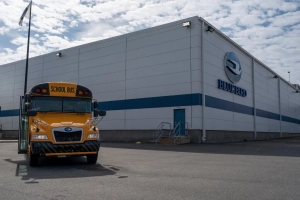LABOR SEES VICTORY AT BLUE BIRD AS A “BELLWETHER” FOR THE SOUTH

Blue Bird, which builds electric school buses, has benefited from a large infusion of federal money. Credit…Matthew Pearson/WABE, via Associated Press
Daniel Flippo, regional director of the United Steelworkers of America’s Southeastern district, was very happy with the vote. “For too long,” he said “corporations cynically viewed the South as a place where they could suppress wages and working conditions because they believed they could keep workers from unionizing.”
But union officials are beginning to show optimism about prospects for the region in the wake of a landmark union victory at Blue Bird, a factory in Fort Valley, Georgia, that builds electric school buses. The surprise vote in which the workers voted 697-to-435 to join the United Steelworkers was supervised by the National Labor Relations Board.
“This is just a bellwether for the future,” predicted AFLCIO President Liz Shuler, “particularly in the South, where working people have been ignored.”
Blue Bird, a company that employs 1,400 workers, has been the recipient of $500 million in federal funds for aid to companies specifically to combat climate change. In building electric school buses to replace diesel school buses, Blue Bird qualified for a part of the $370 billion included in the Inflation Reduction Act for clean energy to combat climate change. But the aid also came with the proviso that companies must remain neutral in any union organizing drive in their plants and to voluntarily recognize the union based on a show of majority support. Further, no federal money may be used to oppose a union election. These provisions are important aids to unions seeking bargaining recognition from employers. And although the union charged that the company had violated some of the law, it srill aided the Steelworkers Union in its victory at Blue Bird.
The union hopes it will be just the beginning in the South with new manufacturers of electric vehicles, including foreign automakers like Mercedes-Benz, BMW, and Hyundai moving in, partly because of its history of hostility to unions.
NY Times print edition, 5/13; NY Times online edition, 5/12


